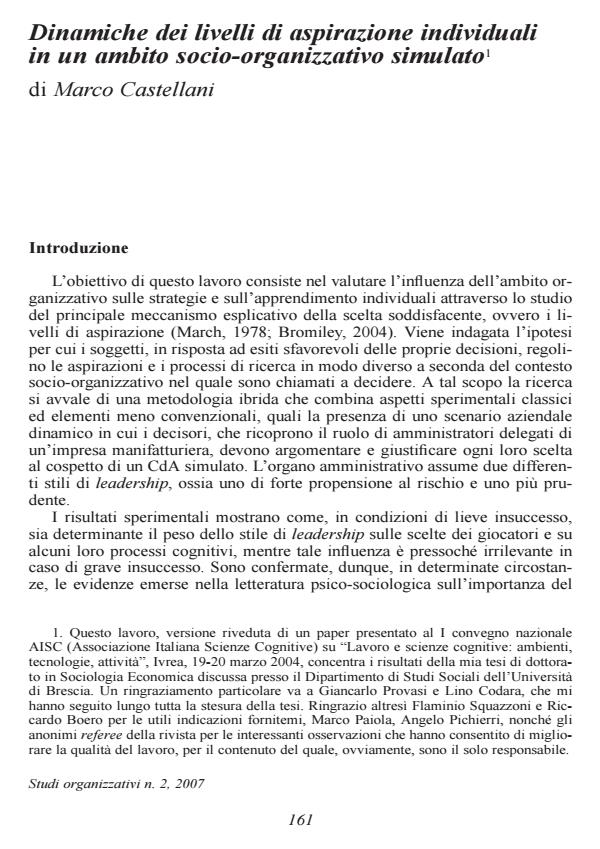Dinamiche dei livelli di aspirazione individuali in un ambito socio-organizzativo simulato
Titolo Rivista STUDI ORGANIZZATIVI
Autori/Curatori Marco Castellani
Anno di pubblicazione 2007 Fascicolo 2007/2
Lingua Italiano Numero pagine 27 P. 161-187 Dimensione file 730 KB
DOI
Il DOI è il codice a barre della proprietà intellettuale: per saperne di più
clicca qui
Qui sotto puoi vedere in anteprima la prima pagina di questo articolo.
Se questo articolo ti interessa, lo puoi acquistare (e scaricare in formato pdf) seguendo le facili indicazioni per acquistare il download credit. Acquista Download Credits per scaricare questo Articolo in formato PDF

FrancoAngeli è membro della Publishers International Linking Association, Inc (PILA)associazione indipendente e non profit per facilitare (attraverso i servizi tecnologici implementati da CrossRef.org) l’accesso degli studiosi ai contenuti digitali nelle pubblicazioni professionali e scientifiche
Starting from the main findings pointed out both by theoretical and empirical approaches of bounded rationality, the paper examines the influence of organizational context on attainment discrepancy as a driving factor for adapting individual aspiration levels. The methodology used is a non-standard experimental technique combining traditional cognitive psychology setting and a role playing scheme. A number of individuals, with the same risk attitude composition, was involved into an experiment in which each one had to face a simulated socio-organizational scenario and to take a three-steps choice to improve the initial troubled economic condition of the simulated firm. The paper, playing upon a mixed quantitative (statistical indicators) and qualitative (cognitive mapping) analysis, draws conclusions on how individuals react respectively to light and deep scenario failure. In the first case, individuals are extremely influenced by the organizational climate, simulated by a fictitious board of directors that listens to individuals’ reasons after each choice and addresses next firm’s strategy (a risk taking and a risk averse leadership style). This issue somehow opposes the original March and Simon’s major argument that aspiration levels decrease in case of unsuccessful outcomes. In the second case (deep failure), individuals increase their aspiration levels due to their risk seeking behaviour, and this takes place apart from any socio-organizational pressure or style. The latter experimental result is explained in terms of some cognitive mechanisms that are referable primarily to a sunk costs effect (people are urged to adopt a losing strategy instead of considering as definitively vanished the costs of the earlier period), and secondly to a selective attention process that supports subjective evaluation by which individuals consider a strategy good enough playing on specific reasonable criteria in their cognitive representation.;
Marco Castellani, Dinamiche dei livelli di aspirazione individuali in un ambito socio-organizzativo simulato in "STUDI ORGANIZZATIVI " 2/2007, pp 161-187, DOI: